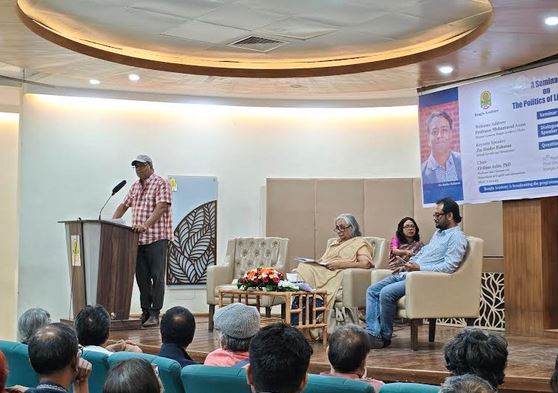News Flash

DHAKA, Nov 11, 2025 (BSS) - A seminar titled 'The Politics of Literature' was held at the Poet Shamsur Rahman Seminar Hall of Bangla Academy this afternoon portraying a parallel relationship between the literary and political system of the country.
The event, organized by Bangla Academy, featured British novelist and broadcaster Zia Haider Rahman as the keynote speaker.
Bangla Academy Director General Professor Mohammad Azam delivered the welcome address, while Professor Dr. Firdaus Azim of Brac University presided over the session.
During the seminar, discussions centered on the intersection between literature, power, and politics, exploring how contemporary narratives forms shaped by social and political realities.
Writers, academics, researchers, and students attended the session, engaging in a lively exchange of ideas about the evolving relationship between literary expression and political thought.
In his welcome speech Bangla Academy DG Prof. Mohammad Azam focused on the political nature of literature.
He said, "All literature is inherently political and even when it doesn’t explicitly address politics because it reflects and reveals power relations within society."
Prof. Azam also said that the production, distribution, and reception of literature are all influenced by politics, from language dominance and class power to representation and cultural capital.
Delivering the keynote speech, renowned British-Bangladeshi novelist Zia Haider Rahman said that while freedom of expression is often considered the cornerstone of literature and art, true freedom can only thrive in a culture grounded in accountability.
“We might talk about freedom of expression as a necessary condition for literature or art. But it is accountability that delivers freedom. When those forces that would seek to limit such freedom are properly accountable, be they state or non-state actors, then freedom has the upper hand,” he said.
He noted that accountability serves as the bridge between creativity and governance, connecting a thriving literary culture with a vibrant political one.
“Accountability is what a thriving literary culture has in common with a thriving political culture. Both sit in a broader culture of accountability and mediocrity thrives wherever accountability is absent,” he said.
Laying emphasis on accountability, he marked this as a mechanism for recognising excellence and nurturing values that elevate society.
He said, “Accountability in the public space is also the very same mechanism by which we identify talent, the good, or those values that we want to advance in our society.”
“No literary culture can flourish without a flourishing and sophisticated culture of literary criticism,” he added.
Drawing a parallel between good governance and literary vitality, he said, “Without proper accountability, good governance doesn’t stand a chance, and without literary criticism, literature will wither."
A Q&A session followed the discussion.
Professor Dr. Firdaus Azim of Brac University delivered the concluding remark expressing hope for the continuation of revolution in both literature and political practices.